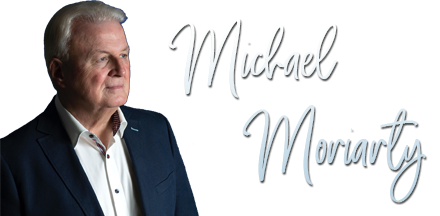A few short years ago I attended an open-air event at a building site which was to be the location of a new high-tech school. There was an impressive array of VIPs and dignitaries who were all awaiting the arrival of the ( then) Irish Taoiseach ( Prime Minister), Enda Kenny, who duly arrived and emerged from his state car. As all the attending dignitaries prepared to welcome him and shake his hand, he walked passed them to firstly shake the hand of the man sitting in a large earth-moving vehicle. Only then did he turn to the line of waiting dignitaries.
I was so impressed but not surprised by this gesture by the Taoiseach. Having being present at public events where he was in attendance I knew his innate ability to genuinely connect with everyone. Those that least expected his attention were the first to receive it. He presented as a person who was inclusive, caring and charming, but most of all he was genuine and authentic.
You may recall from your own life experience, particular individuals you admired because they were models of inclusiveness. From the political world I was always very impressed with American president John F. Kennedy and South African president Nelson Mandela. I never met them but even from afar I felt they were talking to me. They had the innate power to connect with our souls.
In life we wish to feel included and we are attracted to those who show empathy, who listen and who genuinely engage with us. In our communities, in our workplaces, in sports clubs or other locations we admire and follow those who genuinely foster holistic inclusion. All leaders need followers and the best leaders are those who make authentic connections, show they genuinely care and show they value others. They are socially inclusive.
Whether in the workplace, in the community or in public life , it is the genuine inclusive leader who strives to build a supportive , inclusive environment, an environment of involvement, respect and collaboration where all feel valued and heard.
Inclusive leaders want to build emotionally safe and respectful working and living environments which promote a sense of belonging and where people are genuinely valued. When you think of a teacher you admired at school, or a sports team manager or trainer you genuinely admired, it is very likely that you had a feeling you were respected for who you were, you were included not excluded, and you felt good about yourself after talking to them.
What is it about some leaders who attract us to them? Most likely they are people with good emotional intelligence who have a genuine interest in the wellbeing of others. They are self-aware and open-minded but would also be aware of any particular bias or blind spots they may have and would have taken action to mitigate them. They know the importance of on-going self-improvement.They are not afraid to show their vulnerabilities and their level of emotional intelligence makes them well placed, therefore, to recognise and support colleagues or friends.
To be seen as genuine and authentic the inclusive leader knows that vulnerability is about being human. It is not a weakness for them to show they are not perfect, rather it shows they have the courage to be themselves. Vulnerability and authenticity are at the heart of human connection and people resonate with those leaders who show they are genuine and authentic. Inclusive leaders know that people see through the pretense of trying to appear perfect, intelligent and strong. People respect authenticity in their leaders which, in turn, fosters greater loyalty. Being human is not a flaw.
Because they know their own vulnerabilities, inclusive leaders are more tolerant of others who make mistakes .In a workplace setting their inclusive mentality and their genuine interest in others means they are disposed to grow and support colleagues by exploiting their real talents. Because they have genuine self-awareness they can easily empathise with others. They can connect at a level other than at surface level because they are seen as been genuine and transparent.
People can belong to an organisation which is diverse but not inclusive. Diversity is more than relating to gender, race, religion or disability; it can also relate to diversity of knowledge, opinion, expertise and perspective. Such diversity should be respected, valued and encouraged. We need to live diversity but we need to practise inclusion. Inclusive leaders welcome diversity and ensure genuine inclusion where all opinions and perspectives are valued. They know that diversity stimulates innovation and productivity because there is real strength in difference. Inclusive leaders do not feel threatened by such diversity, but rather, actively promote an inclusive culture.
If people genuinely feel they are emotionally safe in a group they will know their opinions are valued and respected. Inclusive leaders recognise they are not the font of all wisdom and they see there is strength in difference. They will know that if people feel they belong they will feel empowered and energised. Teams of people with diversity of opinions will feel respected and valued. The inclusive leader will have built a supportive and inclusive environment.which values respectful and open dialogue where people feel more connected. Being emotionally connected to the team and its organisation will generally enhance productivity
 .
.
(Photo by Marvin Meyer on Unsplash)
Studies show that if people feel trusted and valued they perform better. They can work together to accomplish something by cutting across divisions and silos. The genuinely inclusive leader will keep team members connected to each other and also connected to the goals and objectives of the organisation. Respecting diversity and practising inclusion requires cooperation and collaboration to realise a shared vision. While there may be different roads to an agreed destination the team can only travel one.
An Islamic proverb states; A lot of different flowers make a bouquet. It is now generally accepted that better decisions arise from diversity in thinking. A diverse mix of voices can manage to collaborate, thereby strengthening innovative capacity and contributing to successful outcomes. Diversity; the art of thinking independently together- Martin Forbes.
A leader with an inclusive mindset promotes healthy relationships. People may not be the same but they are treated equally. Inclusive leaders are seen as being fair and honest; they are seen as respectful and empowering. They will have empathy for and interest in the welfare of others. They value individual talents, will encourage learning and development but will also be quick to act if an individual is not pulling their weight, is not contributing, is not fully engaged or is not fully present.
The attitude and values of the leader can have a powerful impact on an organisation. The leader’s values, attitude, behaviour and leadership style significantly influences the behaviour of others. The culture and values of an organisation or team reflect the values and beliefs of its leadership. Inclusive leaders are constantly reflecting on their own behaviour and attitudes and this self-awareness is necessary for true social awareness. You need to know yourself before you seek to know others.
Inclusive leaders are very aware that success depends on the commitment and abilities of others and not just their own leadership ability. Leading any organisation entails risks and a successful leader needs allies to succeed. Leadership styles have changed and no longer is leadership about power being vested in a single person or position. Indeed position does not give power; followers give power and the leader who listens to and has empathy for colleagues or followers will earn their respect and support. This is a trademark characteristic of inclusive leadership.
Inclusive leaders are known for their value-driven behaviour. They will see that both individuals and teams thrive in a positive emotional climate. They know that teamwork and collaboration is what inclusive leadership is all about. If everyone is moving forward together, then success takes care of itself- Henry Ford.
Inclusive leadership is a journey worth taking. Those of us who have felt excluded know the value of genuine inclusiveness. Social inclusion promotes social wellness; inclusion accommodates and respects diversity. Diversity can create powerful dynamics which an inclusive leader can harness to create added value. Such a leader can foster a welcoming and inclusive team or workplace where people with diverse backgrounds or perspectives can thrive.
Think again about your own life journey and about those leaders you liked and respected. Invariably, they recognised and acknowledged you, supported you and empathised with you. You recognised their authenticity and you trusted them. You knew they would treat you fairly; you knew they would listen to you and you felt valued.
Even if you did not personally know a particular leader you still recognised the traits of an inclusive leader by what they said, by what they did and by how they made you feel. Perhaps on the political world stage today you can recognise those leaders who promote inclusiveness, hope and diversity and those who promote exclusiveness, separation and isolation. Which promotes peace and harmony?
On a final note, I would rather place the future of our world in the hands of inclusive leaders who promote respectful relationships and who value diversity as core elements of fair and equitable societies. The way you see people is the way you treat them. And the way you treat them is what they become- Johann Wolfgang Von Goethe.

(Photo by Kiane Bosman on Unsplash)
(Feature photo by Danica- Tanjutco on Unsplash)

